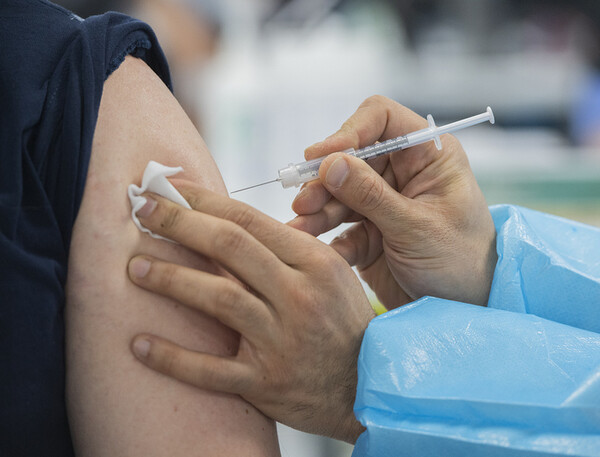By Professor Song Kyo-young, Department of Gastroenterology at the Catholic University of Korea Seoul St. Mary's Hospital
Stomach cancer patients must undergo treatments that are highly damaging to the body, such as surgery and chemotherapy. Specifically, they lose weight, especially muscle mass, and become malnourished because they eat less and have difficulty digesting and absorbing food.
In the long run, this can lead to a decrease in immunity, making them vulnerable to infectious diseases and cancer recurrence. This can lead to frequent colds and flu, unexpected outbreaks of shingles, and even hospitalization for pneumonia.
For this reason, immunizations usually reserved for immunocompromised children and older adults are essential for cancer patients. Let's look at what types of vaccinations are needed for stomach cancer patients and what to look out for.

The flu virus is different from that of the common cold, requiring vaccination every year
Unlike the common cold, the flu is an infection caused by a virus called influenza. In addition to the usual respiratory symptoms of fever, cough, and body aches, it can cause serious complications, including pneumonia, myocarditis, encephalitis, multiple organ failure, and sepsis.
People at high risk for the flu, including those 65 years of age and older, children under two years of age, people with various chronic diseases, and cancer patients, should be vaccinated every October and November. It's vital to get vaccinated because it protects you from getting sick and reduces your risk of complications and death if you do get sick.
The viruses that cause the flu are different every year, so you must get vaccinated every year, and you can get a vaccine that covers four viruses (quadrivalent) or three viruses (trivalent). Antibodies develop about two weeks after vaccination, so it's important to get vaccinated before the winter season begins.
Shingles, a problem when immunity is low, can be prevented with a recombinant vaccine

Shingles is a disease that causes rashes and blister-like lesions on the skin that can be very painful. It's caused by a virus that remains in the body after a childhood infection with chickenpox.
The chickenpox virus lays dormant in the ganglia, and when the immune system is weakened, it travels down the nerves and causes inflammation in the skin. In other words, the virus that causes chickenpox and shingles is the same.
The disease is different, but the cause is the same, so the virus is now called the Varicella-Zoster virus.
Shingles are rare in younger people and usually occur in immunocompromised adults over 60. The risk is also increased in stomach cancer patients undergoing cancer treatment who are immunocompromised.
Even if you got the chickenpox vaccine as a child, it doesn't protect you against shingles, so you need to get the shingles vaccine to prevent it.
The shingles vaccine is available as a live attenuated virus (live vaccine) or a genetically recombinant vaccine. Cancer patients usually use the recombinant vaccine, which requires two shots.
Pneumococcus, which causes pneumonia and meningitis, should be prevented with 23-valent polysaccharide vaccine
The disease caused by the bacteria that causes pneumonia doesn't stop at pneumonia but can also cause meningitis, sinusitis, otitis media, and more. For this reason, it is recommended that children, adults over 65, and patients under 65 with certain high-risk conditions, including cancer, get vaccinated against pneumococcal disease.
Pneumococcal vaccines are medications that use the body's immune response to prevent infections caused by pneumococcal bacteria. They work by using antigens from pneumococcal bacteria to trigger the body to produce antibodies, which then defend against the pneumococcal infection through an immune response that eliminates the antigens.
Pneumococcal vaccines are divided into 23-valent polysaccharide (PPSV) and 13-valent protein conjugate (PCV). People with stomach cancer usually only need one dose of PPSV.
The timing of vaccination due to surgery or chemotherapy is also important. If you are scheduled for surgery or chemotherapy, you should get the vaccine two weeks beforehand. If you've had surgery, it's best to wait at least a month afterward. If you are undergoing chemotherapy, you should not consider it as a possibility, but it is safe to wait until about one month after the end of chemotherapy.

